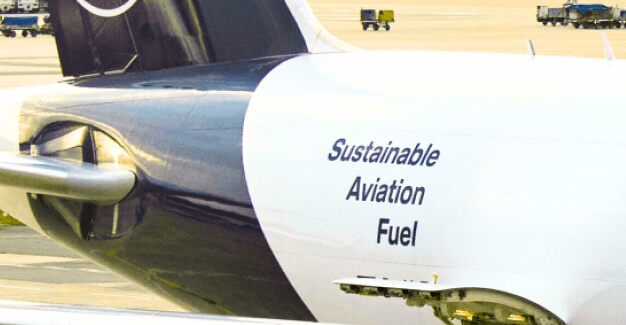Sustainable Aviation Fuel (SAF)
Reshaping the Aviation Landscape
Green Aviation for a Better Planet
What is Sustainable Aviation Fuel?
Sustainable Aviation Fuel (SAF), also known as bio-jet fuel or alternative aviation fuel, is a type of aviation fuel that is produced from renewable and sustainable resources. SAF is designed to reduce the environmental impact of aviation and is considered a key component in the industry’s efforts to mitigate greenhouse gas emissions and promote sustainable practices.

Production Process of Sustainable Aviation Fuel


Sustainable Aviation Fuel can be derived from diverse sustainable sources, commonly referred to as feedstocks. These feedstock options encompass forestry and agricultural residues, repurposed cooking oil, captured atmospheric carbon, and green hydrogen Energy. The selected feedstock undergoes a refining process known as hydroprocessing, where it is converted into hydrocarbon molecules, resulting in a cleaner, more sustainable fuel product. Once the SAF is produced, it is blended with conventional jet fuel in various proportions to create a certified aviation fuel. Sustainable Aviation Fuel is rigorously tested and certified to meet industry standards for safety and performance.
Avaada Elevates To New Heights, Driving Aviation's Net-Zero Future With Sustainable Aviation Fuel

Avaada is actively working across all parts of the value chain to support the aviation industry on the pathway to net zero. In addition to investing in the manufacture of SAF and supporting the development of new technologies for its production.
The company offers a diverse portfolio of renewable energy solutions, making us a one-stop destination for sustainable aviation fuel and other green energy needs. Our solutions are tailored to meet the specific requirements of various industries and sectors. We continually invest in cutting-edge technologies to maximize the efficiency and effectiveness of our SAF production, ensuring the highest quality standards are met.
Why Sustainable Aviation Fuel is important?
Sustainable Aviation Fuel can help significantly in reducing carbon emissions. It can help the aviation industry in meeting ambitious sustainability targets. Through SAF, carbon emissions can be reduced by up to 80 percent, as compared to traditional aviation fuels.
During combustion, Sustainable Aviation Fuel results in fewer particulate emissions which leads to improved air quality around airports and along flight paths. This not only benefits the health and well-being of nearby communities but also aligns with aviation industry commitments to be responsible corporate citizens.
Besides, SAF aviation fuel also diversifies the aviation industry’s fuel sources, reducing its reliance on fossil fuels and enhancing energy security. This promotes resilience against supply disruptions and price volatility.
Moreover, SAF fuel can be readily integrated into the existing aviation infrastructure without the need for aircraft modifications or significant changes to refuelling processes. This ensures a smooth transition to more sustainable aviation practices.
SAF, carbon emissions can be reduced by upto

BENEFITS OF
Sustainable Aviation Fuel Surpass Traditional Fossil Jet Fuel
Our internal research and development team has determined that, throughout its lifetime, a batch of SAF can cut emissions by up to 75% when compared to fossil jet fuel. This includes production, distribution, transportation, and combustion. It can also reduce other harmful emissions like particulates and sulfur by 90% and 100% respectively. Hence, mitigating the effects of climate change on our planet requires these reductions.

DECODING THE
Importance of Sustainable Aviation Fuel
The high energy density of jet fuel is the driving force behind the success of commercial aviation. In the present era, no other practical alternatives exist for swiftly transporting groups of people across vast distances, rendering our reliance on aviation fuel. For example, a round trip from London to San Francisco produces nearly 1 tonne of CO2e per economy ticket. With the aviation sector poised to accommodate over 8 billion passengers by 2050, it becomes imperative to address and curtail aviation’s carbon emissions, and SAF represents one of Avaada’s proactive measures in these endeavours.
Frequently Asked Questions
Is Sustainable Aviation Fuel suitable for all aircraft?
Any aircraft certified for using the current specification of jet fuel can use sustainable aviation fuel.
What are the prospects of Sustainable Aviation Fuel?
The prospects for Sustainable Aviation Fuel are undeniably promising and hold the potential to revolutionize the aviation industry. As nations and industries increasingly prioritize sustainability, the demand for SAF is on the rise. Airlines, governments, and businesses are actively seeking cleaner, more responsible aviation options. Moreover, it is also receiving strong support from aviation regulatory bodies globally, further propelling its adoption and growth. The diversification of fuel sources through Sustainable Aviation Fuel enhances energy security for the aviation industry and reduces its reliance on fossil fuels. Its reduced particulate emissions contribute to better air quality near airports and along flight paths, benefiting both passengers and communities.
How can we accelerate the demand for Sustainable Aviation Fuel?
Further investment in R&D will improve SAF fuel production technologies, reduce costs, and enhance the efficiency of feedstock sourcing. Also, raising public awareness about the benefits of Sustainable Aviation Fuel, both in reducing emissions and improving air quality, will drive consumer demand and pressure industry stakeholders. Besides, financial incentives implementation such as tax credits, subsidies, and grants will make SAF fuel more economically viable. Additionally, the development and adherence to stringent industry standards for SAF fuel quality and sustainability will ensure its safe and reliable use.
